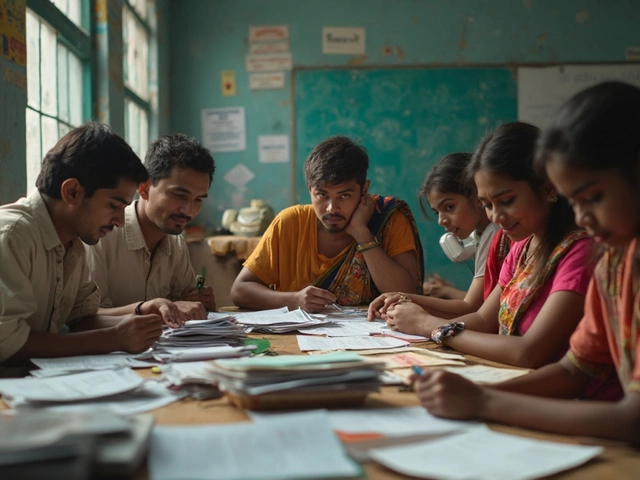Ever wondered about the less-talked-about heroes in the mental health world? Rare mental health charities might not make headlines, but they're doing some incredible work. These organizations focus on unique and often overlooked mental health challenges. They're like the secret handshakes of the charity world—familiar to those who need them, mysterious to everyone else.
Imagine you're dealing with a rare mental health challenge. It's hard enough when mental health issues are more mainstream, but when it's something unique, finding help can feel like searching for a needle in a haystack. That's where these rare charities shine. They step in where others don't, offering hope, guidance, and practical support tailored to specific needs.
These charities are more than just places to find help. They're breeding grounds for innovation and understanding. By concentrating on niche issues, they develop specialized programs and strategies that have ripple effects in the broader mental health field. Feeling inspired to dive deeper into this mysterious yet impactful corner of the charity world? Let's explore what makes them so special.
- Unseen Heroes: What Makes a Charity 'Rare'?
- Unique Challenges and Tailored Solutions
- How to Get Involved and Make a Difference
- Success Stories: Transformative Impact in Action
Unseen Heroes: What Makes a Charity 'Rare'?
When we talk about mental health charities, names like the Mental Health Foundation or Beyond Blue might pop into your head. But what about those smaller, lesser-known charities that focus on rare conditions? That's where the 'rare' in rare mental health charities comes into play. These organizations may not be well-known, but they are instrumental in helping those with unique mental health challenges.
So, what makes a charity 'rare'? For starters, it's all about their focus. These charities zero in on specific mental health conditions that aren't widely recognized or understood. For instance, think about conditions like prosopagnosia (face blindness) or Synesthesia. Help from mainstream charities might not suffice here, and that's exactly why these specialized charities exist.
Specific Focus and Expertise
These charities specialize in areas where others don't tread. They're driven by the passion to fill gaps in the mental health support system. Take the Misophonia Association, for example. They focus on a condition that causes emotional reactions to everyday sounds. Their targeted research and support can be a lifeline for individuals feeling ignored by broader institutions.
Community and Awareness
Building a strong, engaged community is another cornerstone of their work. These charities not only offer support but also foster a sense of belonging among those who might otherwise feel isolated. They often hold forums, workshops, and peer-support networks. For example, the Face Blindness Awareness organization hosts meetups for people to share experiences and strategies, helping them realize they're not alone.
Navigating Unique Challenges
Operating in a niche has its hurdles. Limited funding and public awareness are common obstacles. These charities often rely on a dedicated volunteer base and grassroots fundraising efforts to get by. They might not have the huge budgets typical of larger charities, but they make a disproportionate impact with the resources they have.
Funding and Resources Table
| Charity Name | Focus Area | Annual Budget |
|---|---|---|
| The Misophonia Association | Sound Sensitivity | $50,000 |
| Face Blindness Awareness | Prosopagnosia | $75,000 |
In summary, rare mental health charities might not be in the spotlight, but they are indispensable for countless individuals. By honing in on specific conditions, creating supportive communities, and resourcefully using what little funding they have, they truly are the rare charity heroes we need but might not always see.
Unique Challenges and Tailored Solutions
Diving into the world of rare mental health charities means facing unique challenges that require specially-crafted solutions. Think about it: mainstream charities might miss these issues altogether, leaving a gap that only specialized organizations can fill.
These rare charities often deal with conditions that people haven't even heard of, let alone understand. This means they have to work harder to raise awareness and educate the public. But with more awareness comes more understanding, and that leads to better support for those affected.
The Power of Specialized Programs
One challenge these organizations face is developing programs that cater to very specific needs. What works for the general public might not work for someone with a rare condition. So, they focus on creating tailored resources. This could include personalized therapy programs, support groups with others who truly get it, and even one-on-one mentoring.
For instance, some charities are pioneering online platforms where people can connect with professionals who specialize in their particular issue. Others are offering virtual reality experiences to help individuals practice coping mechanisms in a safe, controlled environment.
Coping with Limited Resources
Working with limited resources is a reality for many of these charities. They're often not backed by the vast funding more recognized causes receive, yet they power through. Many rely on small donations and the passion of volunteers to make a significant impact. Getting creative with financing and fundraising becomes crucial.
- Some organize unique fundraising events, like virtual marathons or benefit concerts.
- Others look for grants specifically aimed at niche health topics.
- Many forge partnerships with indie businesses and startups for mutual support.
By focusing on what makes them unique, these mental health charities ensure they deliver real value to those who need it most. They're not just applying a one-size-fits-all solution but are constantly adapting to offer genuine, effective help.
Table of Innovative Approaches
| Program Type | Description |
|---|---|
| Online Platforms | Connects users with specialized mental health professionals. |
| Virtual Reality | Offers safe spaces for practicing coping mechanisms. |
| Personalized Therapy | Tailored plans designed for unique mental health challenges. |
Understanding these unique challenges and solutions shows just how crucial and innovative these rare charities really are.

How to Get Involved and Make a Difference
Feeling inspired to lend a hand? Getting involved with mental health charities isn't just rewarding; it’s a game-changer for countless lives. Whether you’re offering time, skills, or financial support, there’s a spot for you.
Volunteer Your Time
Volunteering doesn't always mean you're in the thick of it. You could help organize events, provide admin support, or even lend an ear on helplines. Most charity organizations, big or small, need volunteers who are passionate about making a real impact.
Use Your Skills
Got a knack for writing, accounting, or social media? Transform your skills into something valuable. Many charities need pro bono help to keep things ticking. Plus, you get to feel like a hero while doing what you love.
Donate
If time's tight, you can still contribute financially. Your donations help drive awareness and fund programs that support mental wellness initiatives. Even a small donation can make a huge difference when pooled with others.
Participate in Fundraising Events
Join a fun run, bake sale, or charity ball. It’s a great way to chip in while having a blast. These events not only raise money but also bring people together to support mental wellness.
Spread Awareness
You can be an advocate simply by spreading the word. Leverage your social networks, talk with friends, or share stories. Raising awareness helps break the stigma and brings attention to the wonderful work of rare mental health charities.
Take it from various research that suggests volunteering or donating doesn’t just help others; it boosts your own mental well-being too. So, why not jump in and make a tangible difference today?
Success Stories: Transformative Impact in Action
Diving into the world of rare mental health charities, you'll find inspiring tales of change. These charities may be small, but their impact can be huge. Take the story of Kaori, a young woman in Christchurch, who faced a rare condition causing intense anxiety and sensory overload. For years, she struggled alone until a local charity reached out with resources tailored to her unique needs.
Kaori's life turned around through personalized therapy sessions, helping her navigate everyday tasks that once seemed daunting. Today, she volunteers at the charity, sharing her journey with others. "Knowing there's someone who understands makes all the difference," she recently said in a local news interview.
"We might be small, but the work we do is mighty," says Dr. Amelie Fisher, a renowned psychologist and advisor for several niche mental health non-profits. "These charities fill gaps that would otherwise leave people in the dark."
Transformations That Inspire
Another standout success hails from Wellington, where a charity focused on supporting families with uncommon mental health disorders established a community center. This hub offers counseling, workshops, and social gatherings, creating a nurturing environment. More families now feel empowered to seek help, reducing the stigma around their experiences.
Statistics also underscore these transformations. A recent survey by Wellington University found that 85% of those involved with niche charities felt a significant improvement in their overall well-being. A support system, it turns out, makes all the difference.
Lifting the Community
Rare charities also play a crucial role in raising awareness. By sharing testimonies, conducting workshops, and promoting dialogue, they foster understanding and empathy. Not to mention, they inspire larger organizations to adopt new methods and reach underserved populations.
These mental health charities are like community beacons, offering paths to healing and hope. Curious to help or learn more? There's always room for more hands and hearts in this supportive community!





